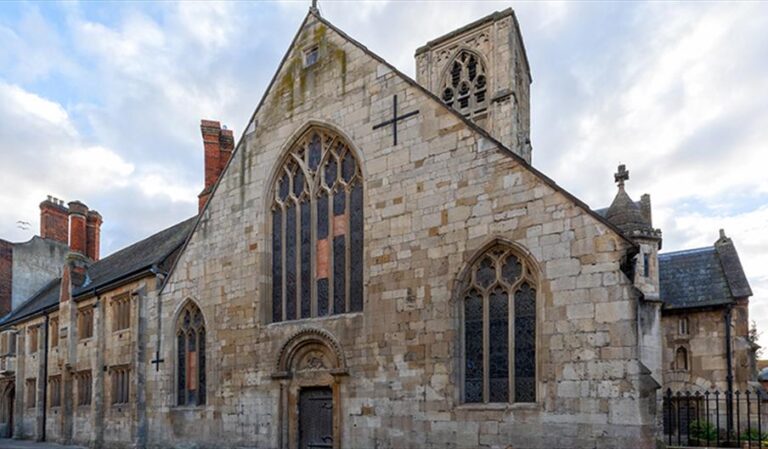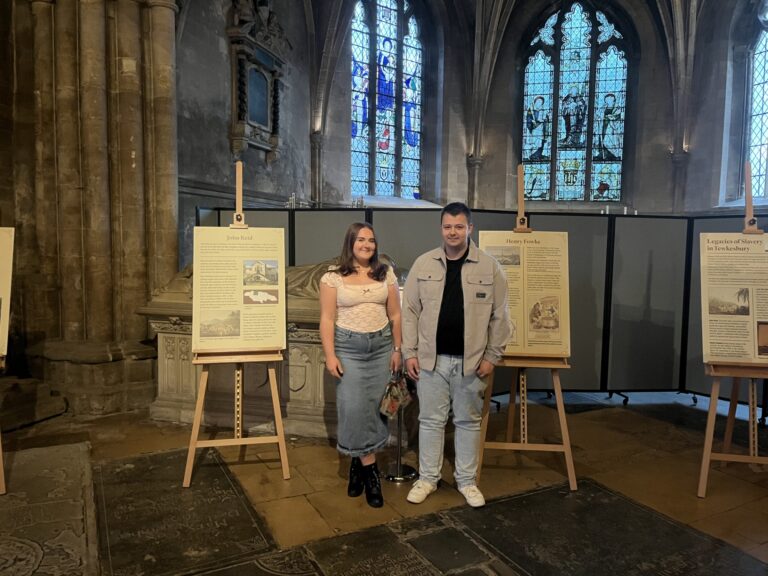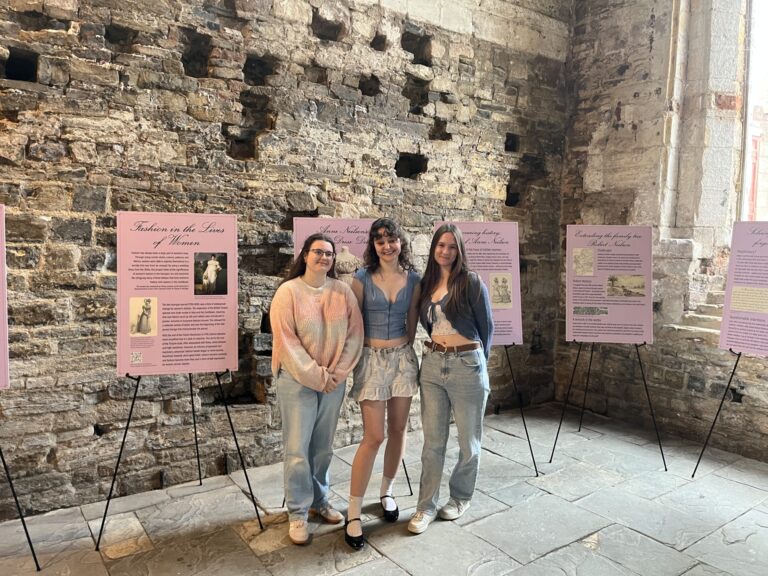| CC4HH
Gloucester and Kindertransport
This project was produced by BA History students Ellie Speck, Izzy Watkins, Emily Langdale, Megan Brown and Yasmine Brigdale. It was exhibited at Gloucestershire Archives for the City Voices Festival in September 2022.
This project focuses on the Kindertransport programme, which helped Jewish children to flee Nazi occupied Europe at the outbreak of the Second World War.
Jump to: Hostel at 18 Alexandra Road | Background to the hostel | Life at Alexandra Road | Life after Gloucester | Britain as a place of refuge | Interview with Cheltenham Welcomes Refugees
The hostel at 18 Alexandra Road
Gloucester became involved in this programme by helping 10 Jewish boys from Poland, Austria and Germany to find refuge in the city. Between 12 June 1939 and 29 November 1941, the boys were housed in a hostel at 18 Alexandra Road.
The boys were:
- Walter Kolpak, aged 12
- Gunther Meyer, aged 14
- Ivan Mularski, aged 14
- Julius Mularski, aged 12
- Peter Nebenzahl, aged 13
- Kurt Reimann, aged 14
- Robert Suschitzki, aged 12
- Arnold Ullman, aged 13
- Harry Vorgang, aged 13
- Werner Zorek, aged 13
This project is important because the refugee crisis is still relevant today. Since starting the project, we have witnessed the refugee crisis caused by the war in Ukraine. Wartime displacement further highlights the journeys made by refugees and the help they receive.
In order to raise awareness and to provide financial support, we ran a successful fundraiser for Gloucestershire Action for Refugees and Asylum Seekers (GARAS; established 1999). During the Kindertransport programme, support was provided by Gloucester Association for Aiding Refugees (GAAR).
A blue plaque was unveiled on 20 June 2022 at the former hostel in Alexandra Road.


Background to the hostel
GAAR
Gloucester Association for Aiding Refugees (GAAR) was created following a meeting at Gloucester Guildhall in February 1939 with the aim of helping refugees from Germany, Austria and Czechoslovakia to settle in the city. GAAR’s first meeting was held on 13 March 1939. It was attended by predominantly women representatives from the Liberal Women’s Association, the National Council of Women, the Catholic Women’s League and others. GAAR helped to organise donations and to raise funds in advance of the arrival of the boys to the hostel. GAAR’s first honorary secretary was Mrs. Hall.
Funding
The Lord Baldwin Fund for Refugees was a nationwide effort to support refugees. In Gloucester, organisations such as the Women’s Institute, Stroud Road Sisterhood, Northgate Mother’s Meeting and 1st Glos. Co. Girls’ Life Brigade all made donations.
By March 1939, the Lord Baldwin Fund had raised £400,000. There were around 3000 kindertransport children already in the country, and around 60,000 more still in Germany. The Gloucester Committee wanted to bring a further 1000 children to Britain.
A successful national fundraising appeal targeting women was held on Mother’s Day, 13 May 1939.
On 21 February 1940, a concert was held at Whitefield Presbyterian Church Hall in aid of the Gloucester refugees.

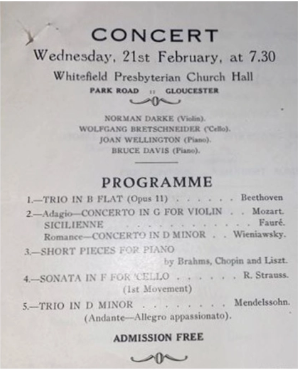
Dr and Mrs Arnstein
The Arnsteins were refugees themselves. They left Carlsbad when German forces invaded. GAAR Executive Committee awarded the married couple £100 a year for taking on the role of wardens at the hostel.

Life at Alexandra Road
Education and Training
The 10 boys attended the nearest senior school, Archdeacon Street School. The headteacher arranged bespoke English classes for them. They hoped to join the Scouts, with uniforms supplied by the Treasurer.
Leisure Activities
A leaflet was published on how to entertain Jewish refugees that included suggestions about providing religious services, educational work and teaching English at social clubs such as the Y.M.C.A.
A shed was built in the garden of 18 Alexandra Road as an incentive for the boys to develop hobbies. A piano and games were bought for the common room and a small library was built from donated books.
A club for refugees was opened on 14 June 1939.
General life
The approximate cost of food for the hostel was 8/- per head per week. There were two menus, one for the summer and one for winter meals.
The refugees went on walks together under the supervision of an English- speaking boy. They went to the cinema once a week, and they were encouraged to write to their parents.
Religious Practice
GAAR wrote to the Rabbi in Bristol about providing religious training to the boys. A rule stated that all children under refugee care must have access to religious teaching in their own denomination.
Life after the hostel
A letter dated 20 November 1941 sets out the resignation of Dr and Mrs Arnstein from their role as refugee wardens. After the closure of the hostel, the boys were separated and provided with new accommodation in Gloucester.
In 1942-43, Arnold and Julius attended Gloucester Technical College, where Arnold studied carpentry and joinery, and building geometry. Julius studied carpentry and joinery, and calculations and geometry. Robert trained as a printer apprentice. Walter worked in a leather factory. Harry worked in the wireless trade. Werner continued to live in Gloucester with one of his friend’s families.
Mrs Hall became Treasurer of the Mid-Gloucestershire branch of the National Council of Civil Liberties.
Life after Gloucester
Stolpersteine (stepping stones)
Stolpersteine can be found across Germany and other places in Europe, in front of houses and residences of those (mostly Jewish people] who faced persecution or death at the hands of the Nazi regime.
Kindertransport offered the refugee boys a chance to escape and live full lives. Many others, even many of the boys’ own families, were not so lucky.
The stepping stones include the name, date of birth and place of death, with many referring to concentration camps.
Zorek family stolperteine are located at the place of their final residence before being taken into Nazi custody. All members of the Zorek family, except Werner, were sent to Auschwitz. These stones allow them to be remembered.

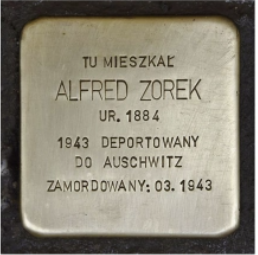

Frieda, Alfred and Erna’s Stolpersteines, Michael Zorek’s family.

Werner Zorek’s son, Michael, has spoken about how these stones allow their family name always to be present in the place they once called home. The stones mean that even just for one second someone can stop and think of the family, and their memory will always remain.
Image left: Werner Zorek’s book about the kindertransport.
Recognition of the hostel
The families of those who were housed at the Alexandra Road hostel felt it right to provide a permanent reminder to commemorate this place of refuge.
A blue plaque unveiled on 20 June 2022 now gives recognition to the house. Future generations will be able to learn about Gloucester’s role in supporting Kindertransport refugees.

Doing our part
After researching Kindertransport and speaking to GARAS and the boys’ relatives, we decided we wanted to do more!
As History students, we have all studied aspects of the holocaust. Learning of this amazing intervention so close to us meant that we wanted not only to learn more but also to raise money.
We organised a pub quiz with our peers to raise money for refugee charities and to raise awareness.
Britain as a place of refuge
Britain has a long history of welcoming refugees and providing a place of safety for those fleeing persecution and violence. This resettlement has not always gone unchallenged and is often still contested.
C16 Dutch Protestants settle in London.
C17 Jews expelled from Spain and Portugal settle in Britain. Protestant Huguenots arrive from France.
C19 refugees fleeing the French Revolution come to Britain. Russian Jewish refugees start to arrive.
C20 Refugee timeline
1914-18 Belgian refugees fleeing war in Europe
1937 child refugees displaced by the Spanish Civil War Refugees
1930s Kindertransport and Jewish refugees
1945-1960s Eastern European refugees fleeing communist takeover, including Hungarians in 1956
1972 Ugandan Asian refugees
1973-79 Chilean refugees
1975-1992 Vietnamese ‘boat people’
1990s refugees fleeing war in the Balkans
C21 Refugee timeline
2016 Syrian refugees
2021 Afghan refugees
2022 Ukrainian refugees
Paddington
Paddington, first published in 1958, was partially inspired by the Jewish refugee children Michael Bond had seen arriving at London’s train station during WWII.
The kindness of the Browns and their ability to welcome a bear into their house continues to give hope to young refugees searching for a home many years after Bond first wrote about Paddington.
Interview with Maggie, Cheltenham Welcomes Refugees

Maggie outlined how Cheltenham Welcomes Refugees (CWR) helps refugees today. Everybody who works for the charity is a volunteer. CWR aims to build a kinder, more inclusive society, and offers support for resettlement, migration and asylum.
Maggie outlined how Cheltenham Welcomes Refugees (CWR) helps refugees today. Everybody who works for the charity is a volunteer. CWR aims to build a kinder, more inclusive society, and offers support for resettlement, migration and asylum.
CWR provides refugees with a welcome into the town. Local businesses, including The Bottle of Sauce, Everyman Theatre, the University of Gloucestershire and many coffee shops, such as the Sober Parrot, provide facilities and support. Local businesses donate electrical goods, such as laptops to aid jobseekers, to support on-going education and to enable contact to be maintained with family members. Other businesses provide space for people to meet, and support scholarships to local schools. The outreach work of CWR includes giving talks at local schools and holding regular meetings.
Cheltenham is recognised as a ‘Town of Sanctuary’ for the welcome it offers to refugees and asylum seekers from across the world. The town puts on activities during the annual National Refugee Week in June.

